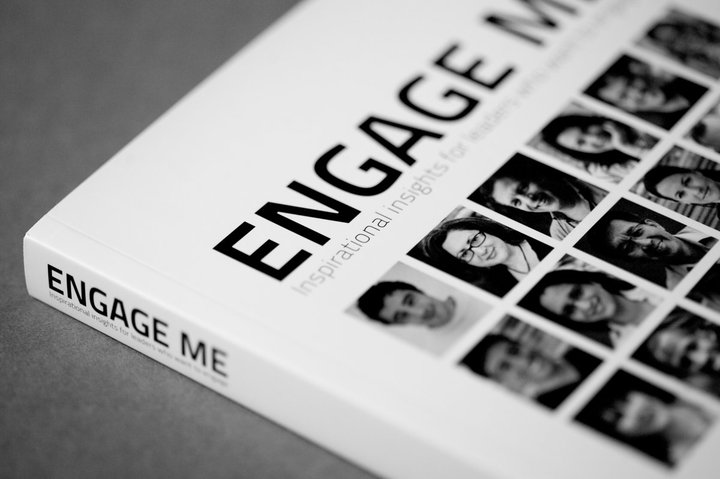Preparing Ourselves For High Performance
Performance is probably the most common word in the business lexicon. We have performance indicators, performance management, business performance, personal performance and of course high performance. Performance is at the heart of what we strive to achieve as leaders – for ourselves our teams and our organisations.
Delivering consistent levels of high performance has never been easy, but in today’s VUCA world, it’s harder than ever. It is one thing to perform well on one project or perhaps to turn in a good set of numbers over a quarter or half. It’s quite another to perform at a consistently high level year after year in the face of our increasingly volatile and stressed business environments.
“Performance fuels self-development so we can constantly expand our brain's ability to create and find purpose.”
Katharine McLennan
Time For Tennis?
We can gain a useful insight as to how we may need to adapt from the sports arena. If we look to the world of tennis there are four men who stand head and shoulders above the rest in terms of consistent performance.
There are any number of young tyros with extraordinary skill who can win a magic set and even a match or two. But the Grand Slam finals, encounters that can last for 4 or 5 hours, are invariably contested by just four men – Novak Djokovic, Andy Murray, Roger Federer and Rafa Nadal.
Over the best-of-five set matches, these are they guys who can perform time and again. On top of their incredible natural talent, they have layered great discipline and thorough physical and mental conditioning. They understand the importance of diet, sleep, rest and complete mental preparation. Additionally, they have to take total personal responsibility.
Whilst supported by a team of experts - physios, coaches, sports psychologists and dieticians, it is the players alone who must perform completely unassisted during a match. This intensive and holistic preparation’ is what enables them to perform both athletically and psychologically whilst under the most intense physical and emotional pressure.
Equipping Ourselves To Perform
As business leaders we need to follow their lead. We must prepare ourselves for sustained high performance. We are all being asked to do more with less against a backdrop of continual change.
Our lives are now a blur and stress and mental health issues are showing up both at work and home with damaging consequences for our families and colleagues.
So what do we need to do to perform consistently well?
i4 Will Help You Improve Performance
Performance is one of the four key competencies in the  developed by Silvia Damiano, founder of the About my Brain Institute. The other three competencies are Collaboration, Innovation and Agility.
developed by Silvia Damiano, founder of the About my Brain Institute. The other three competencies are Collaboration, Innovation and Agility.
The i4 Model is a personal leadership and well-being framework, which has been designed to provide a roadmap for leaders to develop the abilities needed to navigate a VUCA world.
How We Define Performance
Performance is the optimal level, both mental and physical, that a person is able to achieve when implementing a task.
To really understand performance then, we need to look at the integration of both our mental and physical states and think about what a task is, not just in terms of time, but what it requires from our brain.
The Competency of Performance breaks down further into 4 constituent parts (or what we call ‘Pillars’) - these are: integration, balance, ethics and mental readiness. Each of these pillars are explored below. We have also pointed you to related articles!
Integration
This is about effectively bringing together various parts of our brain and body to create a balanced system. When we do this well, we are likely to be calm, but alert, mindful, energised and easy to work with. Key elements are
- Executive function
- Mind-Body alignment and
- The ‘Care’ factor
Executive Function is all about getting the best from the Pre-Frontal Cortex area of our brain. It’s involved in decision-making, planning, abstract reasoning and judgment.
The first stage in Mind-Body alignment is for leaders to be able to perceive their emotions and then align their three brains (head, heart and gut) to govern their actions and decisions.
This enables us to perform better and more consistently - irrespective of external stressors. It also enables us to be mindful of better splitting our attention between task and people care – a failure point for most ‘busy’ leaders.
Read more about Integration!
---
Balance
The brain’s balanced state is better managed when we assign time and attention to actions that can assist us to deal with stress and adversity without affecting our performance. Key factors are
- Physicality
- Down time and
- Sociability
Physicality is about eating well, exercising and allocating time for relaxation and play. We know this to be important, but so often ignore this need – often like a badge of honour.
When work train at the gym, the actual strengthening of muscles takes place in the rest days afterwards – when the muscles repair in response to the stress. In the same way, creating time to re-charge, relax, to socialise with others and to think is not just a nice-to-do, but a vital part of the process in building performance and resilience.
Read more about Balance!
---
Ethics
Ethics is the act of reflecting and finding congruence among our, emotions, thoughts and actions. Core elements are
- Values
- Judgment and
- Congruency
We must be clear on our values - and aware of how they will inform our thinking - and use our judgment to understand, evaluate and make considered decisions. In a business world where the moral compass can appear hopelessly debased, getting clear on what we stand for is vital for both ourselves and our teams.
Finally we must be congruent. This implies saying what we mean and demonstrating it in every sense (body language, tone, attitude, facial expression and actions).
Read more about Ethics!
---
Mental Readiness
This refers to our ability to create a balanced psychological state in which we can perform at an optimal level. It’s about:
- Confidence
- Focus and
- Planning
Firstly, we need create a state of internal confidence to act. We must be able to plan ahead, using skills such as visualisation and physically prepared (by centering and breathing). Crucially, we must develop our ability to focus and refocus.
A person who is mentally ready has mastered the capacity to focus, self-manage and maintain a healthy degree of internal discipline.
Read more about Mental Readiness!
---
When We Do This Badly
Responding to the increased work/life pressure by simply working harder in our long-established and unquestioned work rituals, leads to a steady decline in our performance. At an individual level, we can lack self-awareness, lose control of our emotions and become inconsistent between what we say and do.
This feeds into poor business performance with a likelihood of increased conflict, poor strategy and planning, unethical choices and heightened levels of stress, absenteeism and even mental illness. This is neither a happy nor productive workplace!
When We Do This Well
When we reframe the performance equation to include the brain, things can look very different. By taking care of our mind, body and spirit, we can be confident without being arrogant and remain calm in stressful situations.
We can rely on our good judgment and be focused, disciplined and know how to prioritise. This is good for business. We are more productive and efficient. We contribute to more resourceful and solution-driven teams and make better decisions.
We end up with a brain-friendly culture that is both a better place to work and be, but is also likely to have much higher levels of performance (and reduced levels of absenteeism, disengagement, turnover and mental illness).
When we break it down, so much of this is common sense. It is something we know to be innately true. We know that we are at our best when we are rested, balanced and calm. We know that acting on our instinctive empathy builds connection and contributes to a great culture.
We know that good planning, discipline and consciously working on getting the best out of ourselves and others is the way to great performance. But in the pressure cooker of business as usual we seem to so easily lose track, to wing it, or perform only sporadically.
If we are going emulate the great tennis players to win our own Grand Slams, we need to take a leaf from their book and adopt an ongoing whole-of-body & mind approach.
- i4 Neuroleader (353)
- Leadership & Culture (336)
- Brain Health & Wellbeing (206)
- Innovation (97)
- Performance (85)
- Our News (79)
- Collaboration (68)
- Agility (53)
- Practitioner Stories (44)
- In The Press (36)
- Make Me A Leader (33)
- Balance (31)
- Integration (30)
- Imagination (29)
- Awareness (23)
- Brain-Friendly Channel (22)
- Brain-Friendly Leadership (22)
- Communication (22)
- Curiosity (21)
- Inspiration (19)
- Intuition (19)
- Attitude (17)
- Courage (16)
- Adaptability (14)
- Case Studies (14)
- Drive (14)
- Generosity (13)
- Ethics (9)
- Mental Readiness (9)
- Influence (8)
- Retreat (8)
- Brain-Friendly Leadership (1)
- Oracle Cards (1)
- 1 November 2025 (2)
- 1 September 2025 (3)
- 1 August 2025 (5)
- 1 July 2025 (5)
- 1 June 2025 (2)
- 1 April 2025 (1)
- 1 March 2025 (8)
- 1 February 2025 (3)
- 1 September 2024 (4)
- 1 July 2024 (2)
- 1 June 2024 (6)
- 1 May 2024 (2)
- 1 April 2024 (3)
- 1 March 2024 (1)
- 1 November 2023 (1)
- 1 August 2023 (1)
- 1 July 2023 (2)
- 1 June 2023 (2)
- 1 May 2023 (4)
- 1 April 2023 (2)
- 1 March 2023 (7)
- 1 February 2023 (4)
- 1 January 2023 (1)
- 1 September 2022 (1)
- 1 May 2022 (3)
- 1 April 2022 (1)
- 1 March 2022 (5)
- 1 February 2022 (4)
- 1 January 2022 (4)
- 1 December 2021 (2)
- 1 November 2021 (4)
- 1 October 2021 (3)
- 1 September 2021 (6)
- 1 August 2021 (1)
- 1 April 2021 (1)
- 1 December 2020 (2)
- 1 November 2020 (1)
- 1 September 2020 (1)
- 1 August 2020 (1)
- 1 July 2020 (3)
- 1 June 2020 (4)
- 1 May 2020 (3)
- 1 April 2020 (4)
- 1 March 2020 (6)
- 1 February 2020 (4)
- 1 January 2020 (2)
- 1 December 2019 (3)
- 1 November 2019 (3)
- 1 October 2019 (5)
- 1 September 2019 (4)
- 1 August 2019 (4)
- 1 July 2019 (4)
- 1 June 2019 (5)
- 1 May 2019 (9)
- 1 April 2019 (9)
- 1 March 2019 (8)
- 1 February 2019 (7)
- 1 January 2019 (8)
- 1 December 2018 (5)
- 1 November 2018 (10)
- 1 October 2018 (16)
- 1 September 2018 (9)
- 1 August 2018 (10)
- 1 July 2018 (9)
- 1 June 2018 (8)
- 1 May 2018 (9)
- 1 April 2018 (9)
- 1 March 2018 (9)
- 1 February 2018 (8)
- 1 January 2018 (8)
- 1 December 2017 (6)
- 1 November 2017 (9)
- 1 October 2017 (9)
- 1 September 2017 (8)
- 1 August 2017 (10)
- 1 July 2017 (8)
- 1 June 2017 (8)
- 1 May 2017 (9)
- 1 April 2017 (8)
- 1 March 2017 (6)
- 1 January 2017 (3)
- 1 December 2016 (4)
- 1 November 2016 (5)
- 1 October 2016 (4)
- 1 September 2016 (2)
- 1 August 2016 (4)
- 1 July 2016 (4)
- 1 June 2016 (2)
- 1 May 2016 (3)
- 1 April 2016 (3)
- 1 March 2016 (7)
- 1 February 2016 (2)
- 1 January 2016 (5)
- 1 December 2015 (2)
- 1 November 2015 (2)
- 1 October 2015 (4)
- 1 September 2015 (2)
- 1 August 2015 (2)
- 1 July 2015 (1)
- 1 June 2015 (3)
- 1 May 2015 (4)
- 1 April 2015 (5)
- 1 March 2015 (3)
- 1 February 2015 (3)
- 1 January 2015 (3)
- 1 December 2014 (3)
- 1 November 2014 (3)
- 1 October 2014 (3)
- 1 September 2014 (5)
- 1 August 2014 (4)
- 1 July 2014 (5)
- 1 June 2014 (3)
- 1 May 2014 (1)
- 1 March 2014 (1)
- 1 December 2013 (2)
- 1 November 2013 (1)
- 1 July 2013 (1)
- 1 June 2013 (1)
- 1 May 2013 (3)
- 1 April 2013 (1)
- 1 March 2013 (2)
- 1 February 2013 (1)
- 1 January 2013 (2)
- 1 November 2012 (1)
- 1 October 2012 (1)
- 1 September 2012 (1)
- 1 August 2012 (2)
- 1 July 2012 (1)
- 1 June 2012 (1)
- 1 May 2012 (2)
- 1 April 2012 (1)
- 1 February 2012 (1)
- 1 January 2012 (1)
- 1 November 2011 (1)
- 1 October 2011 (3)
- 1 September 2011 (2)
- 1 July 2011 (1)
- 1 June 2011 (1)
- 1 May 2011 (1)
- 1 April 2011 (1)
- 1 March 2011 (1)
- 1 February 2011 (2)
- 1 January 2011 (4)
- 1 December 2010 (4)
- 1 November 2010 (3)
- 1 October 2010 (5)
- 1 September 2010 (4)
- 1 August 2010 (4)
- 1 July 2010 (3)
- 1 June 2010 (4)
- 1 May 2010 (7)
- 1 April 2010 (5)
Subscribe by email
You May Also Like
These Related Stories

Building Leaders For The Imagination Age: The Case For The i4 Neuroleader Model

Engage Me - Inspirational Insights For Leaders Who Want To Engage



No Comments Yet
Let us know what you think